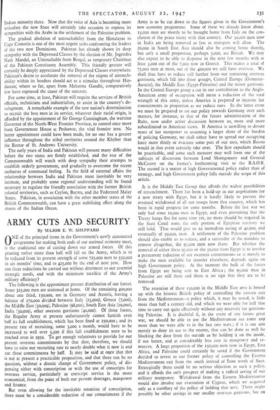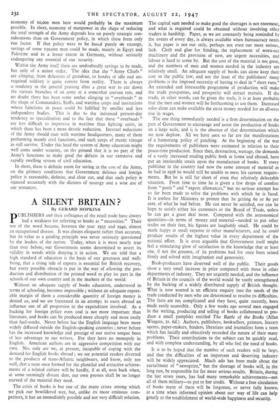ARMY CUTS AND SECURITY
By MAJOR E. W. SHEPPARD
ONE of the principal items in the Government's newly announced programme for making both ends of our national economy meet, is the traditional one of cutting down our armed forces. Of this pruning rather more than half will fall on the Army, which is to be reduced from its present strength of some 725,000 men to 550,000 in six months' time, and to 425,000 by the end of next year. How can these reductions be carried out without detriment to our essential strategic needs, and with the minimum sacrifice of the Army's military efficiency?
The following is the approximate present distribution of our forces. Some 325,000 men are stationed at home. Of the remaining 400,000 about one third, 130,000, are in Germany and Austria, leaving a balance of 270,00o divided between Italy (15,000), Greece (7,000), the Middle East (50,000, Palestine (98,000), South East Asia (20,000), India (50,00o), other overseas garrisons (40,000). Of these forces, the Regular Army at present unfortunately cannot furnish even half its full establishment, which has been fixed at 250,000 ; and its present rate of recruiting, some 3,000 a month, would have to be increased to well over 5,500 if this full establishment were to be reached even in 1950. To get enough volunteers to provide for our present overseas commitments by that date, therefore, we should have to raise our recruiting rate to nearly double what it now is and cut these commitments by half. It may be said at once that this is not at present a practicable proposition, and that there can be no question, without a drastic change of Government policy, of dis- pensing either with conscription or with the use of conscripts for overseas service, particularly as conscript service is the more economical, from the point of both our present shortages, manpower and finance.
But even allowing for the inevitable retention of conscription, there must be a considerable reduction of our commitments if the
Army is to be cut down to the figures given in the Government's new economy programme. Some of these we already know about. 15,000 men are shortly to be brought home from Italy pn the con- clusion of the peace treaty with that country. Our 5o,000 men now in India are being removed as fast as transport will allow. The 20,00o in South East Asia should also be coming home shortly, but only a small proportion, perhaps 5,000, are British. We may also expect to be able to dispense in the next few months with at least 5,000 out of the 7,000 now in Greece. This makes a total of 75,000 men at most, out of the 400,000 we still have overseas. We shall thus have to reduce still further from our remaining overseas garrisons, which fall into three groups, Central Europe (Germany- Austria), the Middle East (Egypt-Palestine) and the minor garrisons. In the Central Europe group a cut in our contribution to the Anglo- American army of occupation will mean a reduction of the total strength of this army, unless America is prepared to increase her commitments in proportion as we reduce ours. In the latter event we must be prepared to tee our policy towards Germany over such matters, for instance, as that of the future administration of the Ruhr, now under active discussion between us, more and more subordinated to American views. If America is unwilling to devote more of her manpower to assuming a larger share of the burden of policing Germany, we shall either have to spread our occupying force more thinly or evacuate some part of our area, which Russia would in that event certainly take over. The first expedient should be practicable, and some such measure may well form one of the subjects of discussion between Lord Montgomery and General McCreery on the former's forthcoming visit to the B.A.O.R. The second is a matter of high Governmental policy rather than of strategy, and high Government policy falls outside the scope of this article.
It is the Middle East Group that affords the widest possibilities of retrenchment. There has been a hold-up in our negotiations for a new treaty with Egypt, but it is hardly likely to prevent the eventual withdrawal of all our troops from that country, which has been in rapid progress for some months. Before the last war we only had some ro,000 men in Egypt, and even presuming that the Treaty hangs fire for some time yet, no more should be required in the Suez Canal zone, the only portion of Egyptian territory we still hold. That would give us an immediate saving of 40,00o, and eventually of 5o,000, men. A settlement of the Palestine problem should also enable us to reduce, and a surrender of the mandate to remove altogether, the 95,000 men now there. But whether the removal of either these 95,000 or the 5o,000 from Egypt is to involve a permanent reduction of our overseas commitments or is merely to make the men available for transfer elsewhere, depends again on high Government policy. At the moment the bulk of the forces from Egypt are being sent to East Africa ; the 95,00o men in Palestine are still there and there is no sign that they are to be removed.
The retention of these 150,000 in the Middle East area is bound up with the historic British policy of controlling the eastern exit from the Mediterranean—a policy which, it may be noted, is little more than half a century old, and which we were able for half that time to carry out quite effectively without any necessity for garrison- ing Palestine. It is doubtful if, in the event of any future great war, we should be able to use the Mediterranean sea route any more than we were able to in the last two wars ; if it is our aim merely to deny its use to the enemy, that can be done as well by blocking the door from the outside as by holding it on the - inside, if not better, and at considerably less cost in manpower and re- sources. A large proportion of the 15o,000 men now in Egypt, East Africa, and Palestine could certainly be saved if the Government decided to revert to our former policy of controlling the Eastern Mediterranean exit from the south instead of from north of Suez. Strategically there could be no serious objection to such a policy, and it affords the only prospect of making a radical saving of our military manpower. Withdrawal from the Eastern Mediterranean would also involve our evacuation of Cyprus, which we acquired only as a corollary of the policy of holding that area. There might possibly be other savings in our smaller overseas garrisons, but an
economy of to,000 men here would probably be the maximum possible. In short, economy of manpower in the shape of reducing the total strength of the Army depends less on purely strategic con- siderations than on Government policy, in which these form only one factor. If that policy were to be based purely on strategy, savings of some 150,000 men could be made, mainly in Egypt and Palestine and to a lesser extent in Germany, without seriously endangering any essential of our security.
Within the Army itself there are undoubtedly savings to be made, but only of a minor order. The idea that the " Army Chiefs " are clinging, from delusions of grandeur, to hordes of idle and un- required soldiery is quite remote from reality. There is always a tendency in the general pruning after a great war to cut down the various branches of an army at a somewhat uneven rate, and no doubt there has been some undue clinging to " overheads " in the shape of Commanders, Staffs, and wartime corps and institutions whose functions in peace could be fulfilled by smaller and less independent bodies. This is due to the increased present-day tendency to specialisation and to the fact that these " overheads " are less difficult to improvise in wartime than fighting units, in which there has been a more drastic reduction. Internal reductions of the Army should start with wartime headquarters, many of them performing mainly civil functions, and such corps of recent vintage as still survive. Under this head the system of Army education might well come under scrutiny, on the ground that it is no part of the Army's functions to make good the defects in our extensive and rapidly swelling system of civil education.
In short, there is definite room for saving in the cost of the Army, on the primary conditions that Government defence and foreign policy is reasonable, definite, and clear cut, and that such policy is squared accurately with the dictates of strategy and a wise use of our resources.



































 Previous page
Previous page